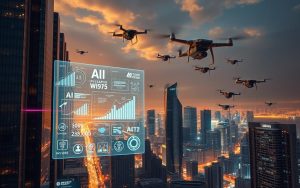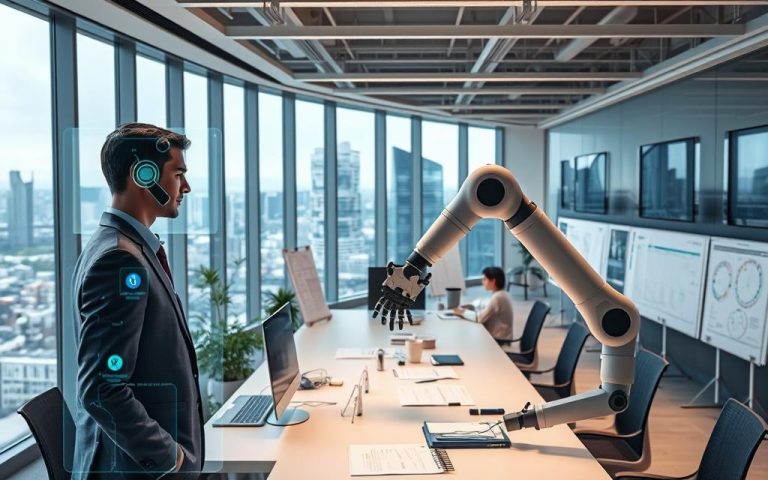How AI Is Transforming Business in 2025
AI is radically changing business strategies and operations. In 2025, it’s becoming a crucial tech catalyst. AI is reshaping how firms approach innovation, productivity, and decision-making1.
Half of companies now use AI in their core operations. Since 2019, business adoption of AI has soared by 270%1.
The global AI market is set to grow rapidly. Experts predict a 38.1% yearly growth until 2030. This surge stems from AI’s ability to transform various business areas1.
Almost all company owners see tech like ChatGPT boosting their operations. They recognise AI’s power to increase sales and streamline processes1.
AI in business is now a reality, not a future concept. Companies are gearing up to use AI’s vast potential. They see it as key to gaining an edge in today’s market2.
The Current State of AI Technology
AI technology has evolved rapidly, changing how businesses innovate and solve problems. Organisations are experiencing new opportunities for tech integration. A significant 55% of organisations have already adopted AI to some extent.
Evolution of Large Language Models
Large language models are a crucial AI breakthrough. These systems have expanded their understanding and processing power. Researchers have created models that can process complex linguistic patterns.
This enables more intelligent interactions. These models now offer:
- Expanded context windows
- Enhanced natural language processing
- Improved comprehension of contextual nuances
Advancements in AI Processing Power
AI systems’ computational abilities have grown remarkably. Specialised hardware like GPUs and TPUs have boosted AI performance. This allows for sophisticated data analysis and real-time decision-making.
Experts predict AI investments could increase global GDP by $15.7 trillion by 20303.
Integration of Multimodal AI Capabilities
Multimodal AI is the next big step in tech innovation. These systems can process and create various data types. They handle text, audio, and visual information seamlessly.
By combining multiple input streams, AI creates smarter solutions for complex business issues4.
“AI is not just a technology, but a transformative force reshaping our understanding of computational intelligence.”
How Artificial Intelligence is Changing World of Business
AI is transforming business operations across global industries. Companies are using AI-driven solutions to gain competitive edges. These cutting-edge technologies are reshaping strategic decision-making and operational efficiency5.

Enterprise adoption of AI solutions has grown rapidly. Approximately 42% of enterprise-level companies have already deployed AI technologies. Another 40% are still exploring AI options6.
AI has huge potential to streamline processes and boost productivity. It’s changing how businesses operate and serve customers.
- Retailers analyse customer data using AI-powered tools
- Financial institutions leverage AI for security applications
- Customer service platforms integrate intelligent chatbots
Businesses face several hurdles when implementing AI. These include limited expertise, data complexity, and ethical concerns.
| Challenge | Percentage of Companies |
|---|---|
| Limited Expertise | 33% |
| Data Complexity | 25% |
| Ethical Concerns | 23% |
Despite challenges, AI continues to drive innovation. Amazon uses intelligent systems to enhance customer experiences. Their recommendation algorithms generate significant sales6.
The future of business relies on AI-driven technologies. These systems can process massive datasets and generate actionable insights7.
AI-Driven Workforce Transformation
Work is changing rapidly as AI reshapes traditional employment. AI workforce transformation is now a reality affecting businesses across many sectors8. Companies are quickly seeing the benefits of adding intelligent systems to their operations9.
Rise of AI Agents in Daily Operations
AI agents are becoming powerful digital workforce partners, handling complex tasks efficiently. Over 92% of organisations plan to boost their AI investments soon8. These intelligent systems can now automate critical processes.
- Financial reporting and expense tracking9
- Customer service interactions9
- Predictive maintenance in manufacturing9
- HR recruitment and talent identification9
Human-AI Collaboration Models
The future of work blends human creativity with AI’s computational power. This is called augmented intelligence. Organisations using AI operationally outperform peers by 44% in key metrics9.
This collaborative approach is changing job roles and creating new skill needs10.
Impact on Employment and Skills Development
AI’s effect on employment is significant and varied. About 300 million full-time jobs could be replaced globally10. However, AI is also creating new opportunities.
The World Economic Forum predicts 97 million new jobs will emerge with technological advances9.
| AI Employment Projection | Percentage |
|---|---|
| Potential Job Automation by 2030 | 30% |
| Companies Increasing AI Investments | 92% |
| Employees Familiar with Generative AI | 94% |
Professionals must keep learning and develop AI skills to stay competitive. Nearly half of employees are seeking formal training to improve their AI adoption skills8.
Strategic Implementation of AI Solutions
A strong AI implementation strategy is vital for businesses seeking a competitive edge. AI business integration needs a comprehensive approach covering multiple organisational aspects11. Currently, 55% of companies use AI, while 45% are exploring potential implementations11.
Successful AI integration involves several key steps:
- Conduct a thorough organisational readiness assessment
- Develop a clear AI strategy aligned with business objectives
- Identify specific use cases with measurable potential impact
- Invest in talent and infrastructure
Strategic AI deployment goes beyond technology. It requires a holistic approach considering culture, workforce capabilities, and ethics12. Companies must tackle data quality issues, talent shortages, and integration complexities13.
Only 7% of organisations use AI in strategic planning, revealing vast innovation opportunities13. By 2025, the global AI market is set to grow by 38%11. This highlights the importance of strategic AI adoption.
Successful AI integration is not about technology alone, but about transforming business processes and creating value.
Businesses should create a flexible AI strategy that allows for continuous learning. This approach helps organisations leverage AI’s potential while staying agile in a changing tech landscape12.
AI’s Role in Business Decision Making
AI-powered technologies are transforming business strategy. Organisations now use sophisticated AI systems for intelligent, data-driven planning. The use of AI in business operations has doubled since 2017.
Data-Driven Strategic Planning
AI processes massive amounts of data at unprecedented speeds. This enables more precise strategic decisions. Companies can reduce decision-making time by up to 80% through quick data analysis.
AI implementation in strategic planning leads to significant operational improvements. Organisations report a 15-20% increase in efficiency. This boost comes from AI’s rapid data processing and enhanced predictive capabilities.
- Rapid data processing capabilities
- Enhanced predictive analytics
- More accurate market trend identification
Automated Risk Assessment
AI risk assessment is vital in modern business strategy. Advanced algorithms help identify and mitigate potential risks with remarkable precision. The IBM Cost of a Data Breach Report reveals significant savings with AI-powered security tools.
Organisations using these tools save an average of USD 1.76 million14. This showcases the financial benefits of incorporating AI into risk management strategies.
Real-Time Market Analysis
AI tools can analyse market trends with up to 90% accuracy15. These systems provide real-time insights, helping organisations stay competitive. They adapt quickly to changing market conditions.
By 2025, 40% of business leaders expect AI to be crucial in understanding customer preferences15. This highlights AI’s growing importance in market analysis and customer relations.
AI is not replacing human decision-makers but augmenting their capabilities with unprecedented analytical power.
Responsible AI and Business Ethics
Responsible AI is evolving rapidly, pushing businesses to create ethical frameworks for tech innovation. AI’s deep integration into organisations makes ethics crucial16. This new landscape challenges companies to adapt swiftly.
Key principles of responsible AI centre on four fundamental aspects:
- Fairness in algorithmic decision-making
- Transparency of AI systems
- Privacy protection
- Security of data and processes
Global regulations are becoming stricter. The EU AI Act may fine up to 6% of revenue for non-compliance16. Organisations must proactively address potential ethical challenges.
AI bias remains a significant issue. Studies show 36% of organisations face negative impacts from AI bias17. Over 60% lost revenue or customers due to unethical AI use17.
Tech giants are leading responsible AI practices. The Responsible AI Institute collaborates with firms like Booz Allen Hamilton and HCLTech16. Together, they’re developing comprehensive governance frameworks for ethical AI use.
Responsible AI is not just a technological challenge, but a societal commitment to ethical innovation.
The future of AI ethics requires diverse input. It needs perspectives from academia, government, and civil society16. This approach ensures tech advances align with human values.
Conclusion
AI is radically transforming the business landscape. Companies now recognise the vital importance of strategic AI implementation. AI business transformation is reshaping organisational capabilities across global markets1819.
A staggering 77% of companies are using or exploring AI applications. AI could contribute £10.4 trillion to global economic activity by 2030. 80% of business leaders believe AI offers strategic benefits1819.
Strategic preparedness is crucial in this technological revolution. Companies must invest in AI capabilities and foster a workforce that can collaborate with intelligent systems. The risks of inaction outweigh the challenges of adaptation1819.
Businesses embracing AI will lead and innovate in the digital era. The AI journey in business is just beginning. Organisations must approach this transformation with vision and ethical considerations.
Continuous learning is key to harnessing AI’s power. The future belongs to those who can use AI to create value. These companies will enhance productivity and reimagine possibilities in the business world.
FAQ
What is the current state of artificial intelligence in business?
How is AI transforming workforce dynamics?
What are the key considerations for implementing AI in a business?
How does AI impact business decision-making?
What are the ethical considerations surrounding AI in business?
Can AI completely replace human workers?
What industries are most impacted by AI in 2025?
How important is AI literacy for modern professionals?
What are the potential risks of AI implementation?
How can businesses prepare for AI integration?
Source Links
- https://hushoffice.com/en-gb/how-does-artificial-intelligence-transform-the-world-of-business/
- https://www.pwc.com/us/en/tech-effect/ai-analytics/ai-predictions.html
- https://www.brookings.edu/articles/how-artificial-intelligence-is-transforming-the-world/
- https://builtin.com/artificial-intelligence/artificial-intelligence-future
- https://www.forbes.com/councils/forbesbusinesscouncil/2023/05/12/how-artificial-intelligence-is-changing-business/
- https://www.ft.com/partnercontent/mediatek/how-artificial-intelligence-is-changing-the-world-of-productivity.html
- https://www.forbes.com/councils/forbesbusinesscouncil/2023/07/24/artificial-intelligence-is-changing-the-world-and-your-business/
- https://www.mckinsey.com/capabilities/mckinsey-digital/our-insights/superagency-in-the-workplace-empowering-people-to-unlock-ais-full-potential-at-work
- https://www.ibm.com/think/topics/ai-in-the-workplace
- https://www.forbes.com/sites/marenbannon/2023/06/22/how-ai-is-changing-the-future-of-work/
- https://smartdev.com/how-to-integrate-ai-into-your-business-in-2025/
- https://www.ibm.com/think/insights/artificial-intelligence-strategy
- https://www.mckinsey.com/capabilities/strategy-and-corporate-finance/our-insights/artificial-intelligence-in-strategy
- https://www.ibm.com/think/topics/artificial-intelligence-business
- https://www.quantexa.com/education/the-role-of-ai-in-decision-making/
- https://www.responsible.ai/
- https://www.forbes.com/councils/forbestechcouncil/2022/11/01/ethics-in-operation-the-business-case-for-responsible-ai/
- https://www.microsourcing.com/learn/blog/the-impact-of-ai-on-business/
- https://www.sganalytics.com/blog/how-artificial-intelligence-is-changing-the-future-of-work/













